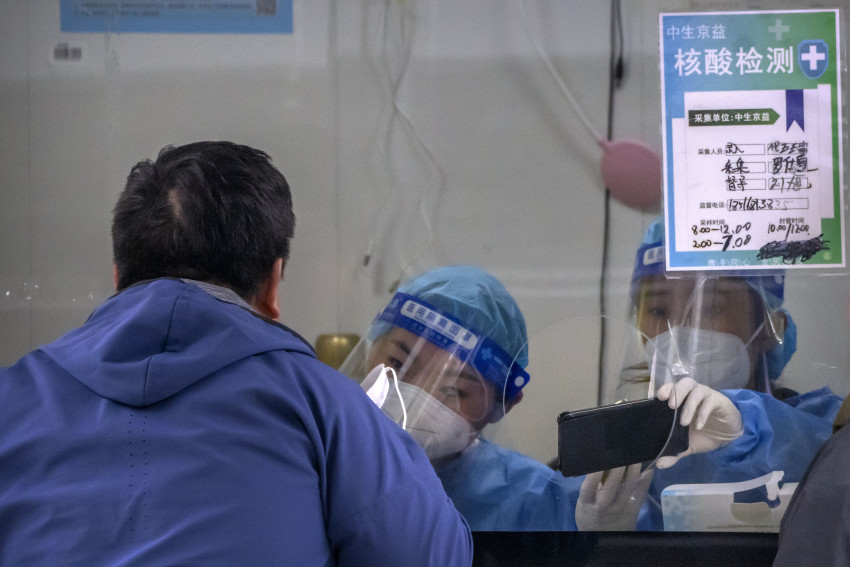China's vast Xinjiang hit with COVID-19 travel restrictions

Sprawling Xinjiang is the latest Chinese region to be hit with sweeping COVID-19 travel restrictions, as China further ratchets up control measures ahead of a key Communist Party congress later this month.
Trains and buses in and out of the region of 22 million people have been suspended, and passenger numbers on flights have been reduced to 75% capacity, reports said Thursday.Read More : Covid-19 infections continue to rise in the UK Read More : Covid-19 infections continue to rise in the UK As is often the case with China’s draconian “zero-COVID” policy, the measures seemed out of proportion to the number of cases detected.
The National Health Commission announced just 93 cases in Xinjiang on Wednesday and 97 on Thursday, all of them asymptomatic. Xinjiang leaders on Tuesday conceded problems with detection and control measures but offered no word on when they planned to lift the restrictions.
Officials are desperate not to be called out for new outbreaks in their regions and Xinjiang has been under special scrutiny over the government's establishment of a series of prison-like re-education centers in which Muslim minorities have been taught to renounce their religion and allegedly subjected to a range of human rights abuses.
Xinjiang's vast surveillance system, relying on ubiquitous checkpoints, facial and even voice recognition software, and universal cell phone monitoring has made controlling travel among the population especially easy.
“Zero-COVID" has been closely identified with Communist Party leader Xi Jinping, who is expected to receive a third five-year term in office at the congress beginning Oct. 16. That's despite criticisms from the World Health Organization and massive disruptions to the economy, education and normal life in China.
Last month, a nighttime bus crash that killed 27 people who were being forcefully moved to a mass quarantine location in southwestern China set off a storm of anger online over the harshness of the policy. Survivors said they had been compelled to leave their apartments even when not a single case had been discovered. “Zero-COVID” has been celebrated by the country's leaders as evidence of the superiority of their system over the U.S., which has had more than a million COVID-19 deaths.
Xi has cited China’s approach as a “major strategic success” and evidence of the “significant advantages” of its political system over Western liberal democracies. Yet even as other countries open up, the humanitarian costs to China’s pandemic approach have grown.
Earlier this year in Shanghai, desperate residents complained of being unable to get medicines or even groceries during the city’s two-month lockdown, while some died in hospitals from lack of medical care as the city restricted movement. Last week, residents in the western region of Xinjiang said they went hungry during a more than 40-day lockdown.
Trains and buses in and out of the region of 22 million people have been suspended, and passenger numbers on flights have been reduced to 75% capacity, reports said Thursday.
The National Health Commission announced just 93 cases in Xinjiang on Wednesday and 97 on Thursday, all of them asymptomatic. Xinjiang leaders on Tuesday conceded problems with detection and control measures but offered no word on when they planned to lift the restrictions.
Officials are desperate not to be called out for new outbreaks in their regions and Xinjiang has been under special scrutiny over the government's establishment of a series of prison-like re-education centers in which Muslim minorities have been taught to renounce their religion and allegedly subjected to a range of human rights abuses.
Xinjiang's vast surveillance system, relying on ubiquitous checkpoints, facial and even voice recognition software, and universal cell phone monitoring has made controlling travel among the population especially easy.
“Zero-COVID" has been closely identified with Communist Party leader Xi Jinping, who is expected to receive a third five-year term in office at the congress beginning Oct. 16. That's despite criticisms from the World Health Organization and massive disruptions to the economy, education and normal life in China.
Last month, a nighttime bus crash that killed 27 people who were being forcefully moved to a mass quarantine location in southwestern China set off a storm of anger online over the harshness of the policy. Survivors said they had been compelled to leave their apartments even when not a single case had been discovered. “Zero-COVID” has been celebrated by the country's leaders as evidence of the superiority of their system over the U.S., which has had more than a million COVID-19 deaths.
Xi has cited China’s approach as a “major strategic success” and evidence of the “significant advantages” of its political system over Western liberal democracies. Yet even as other countries open up, the humanitarian costs to China’s pandemic approach have grown.
Earlier this year in Shanghai, desperate residents complained of being unable to get medicines or even groceries during the city’s two-month lockdown, while some died in hospitals from lack of medical care as the city restricted movement. Last week, residents in the western region of Xinjiang said they went hungry during a more than 40-day lockdown.
Source: www.aljazeera.com
